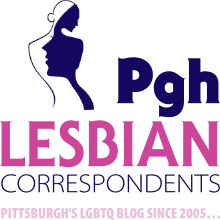From today's Post-Gazette, a letter written by Kurt Colborn of Swisshelm Park:
I have to agree with Sen. Larry Craig's claim that he is not gay. People have forgotten that “gay” is a term of liberation. Being gay means having the maturity to accept yourself as you are. It also means having the courage to represent yourself honestly to the world. Not all homosexual men are deserving of the term “gay.”
Sen. Craig is not gay. He's just a coward. He should spare us bearing witness to his thousand deaths by reversed pleas and canceled resignations (“Craig Vows to Remain in Senate,” Oct. 5). He should slink quietly away to be forgotten.
While I agree that Craig is a coward, the gay v homosexual debate is the interesting point. Homosexual is the preferred term utilized by the right wingnuts (especially the Christian wingnuts) to demonize persons who are LGBTQ. They've taken a rather scientific term, skipped right over the “human” syllables and loaded it with all sorts of sexually inappropriate connotations to make us less human and more “other.”
In reclaiming the terms “gay” and “queer”, the LGBTQ community has made tremendous strides liberating ourselves from a heteronormative society that does often, in fact, demonize us. Being gay is different that identifying as gay. I've heard this theme pop up in quite a few different contexts in the recent past here in my day to day queer life.
Hipster heterosexuals appropriating the term queer when queer identity does not include heterosexuals. Queer is not about being hip (or ironic). It is politco-cultural identity.
A related issue is heterosexual women identifying as bisexual for the purposes of fitting in (and hooking up) with queer women. This blurs the lines for actual bisexual women (see below). However, there is also the issues around using women for sexual gratification and/or exploration which is a patriarchal tool especially icky in the hands of other women.
Bisexual women have a tough time laying claim to being part of the LGBTQ community because of our long-standing division into the gay men and the lesbians. There's a suspicion that bisexual women partnered with a man (straight or bisexual identified themselves) are just “playing” at being gay or trying to have their cake and eat it, too. I'm not sure if gay men feel the same way about bisexual men, but I suspect it is not so much an issue.
Read a few recent posts for an example of the challenges of gay identity for transgender men and women.
The battle over amending ENDA to eliminate gender identity and gender orientation goes far beyond political expediency to tap into notions of who “deserves” to be part of the gay club.
For our local community, the inherent issue truly is about identity and there's a heightened scrutiny of the motives and even the legitimacy of assuming gay identity solely based on sexual preferences.
Personally, I haven't been victimized in any sense by someone pretending to be gay. The closest I came was one date with a bisexual woman who decided she had to date a man to please her parents. I have no clue about the “validity” of her identity as bi and, frankly, didn't care b/c she was a double-dipper <gross!> and that meant no second date from my point of view anyway. I have three friends who are bisexual – two are with men and one with a woman. It never occurs to me to question their gay identity and knowing them makes me a bit more sensitive to making sure of the B in titles and terms. As for the men, the only thing that bothers me is their reluctance to accept the whole bisexual identity thing. That only happens in one case. That makes me feel sad, but it doesn't impact the authenticity of the woman. Nor does it make me feel like the dates I had with her were less than authentic.
I would be annoyed by the hipsters, but I gotta wonder how blurry the line can be between heterosexual supporters and those questioning if they might be gay. It certainly seems blurry in the opposite direction, with plenty of women exploring life as a heterosexual women while working through our identities. At least, that more closely mirrors my own experience, rather than saying I was simply closeted or in denial or some other explanation that solidly defines my sexual orientation during the years I lived as a heterosexual woman. I would say hanging around gay people, spending time at their events and being supportive is completely different than soliciting sex in a bathroom stall or crawling through a bar looking for a woman to deceive.
That being said, it makes sense that queer men and women resent their identity being co-opted. If that were my scene, I might feel differently. But my scene is very hetero-mixed and filled with lots of straight men.
So, the gay identity is hotly contested even within the community. Those of us on the inside understand how nuanced and diverse we are, but, to the larger population, it is one big mass of homosexuals – supporters and opponents alike. I sort of like identifying Craig as a homosexual man, be he bi or gay, while stating that he has not claimed identity as a gay man (or a bi man).










